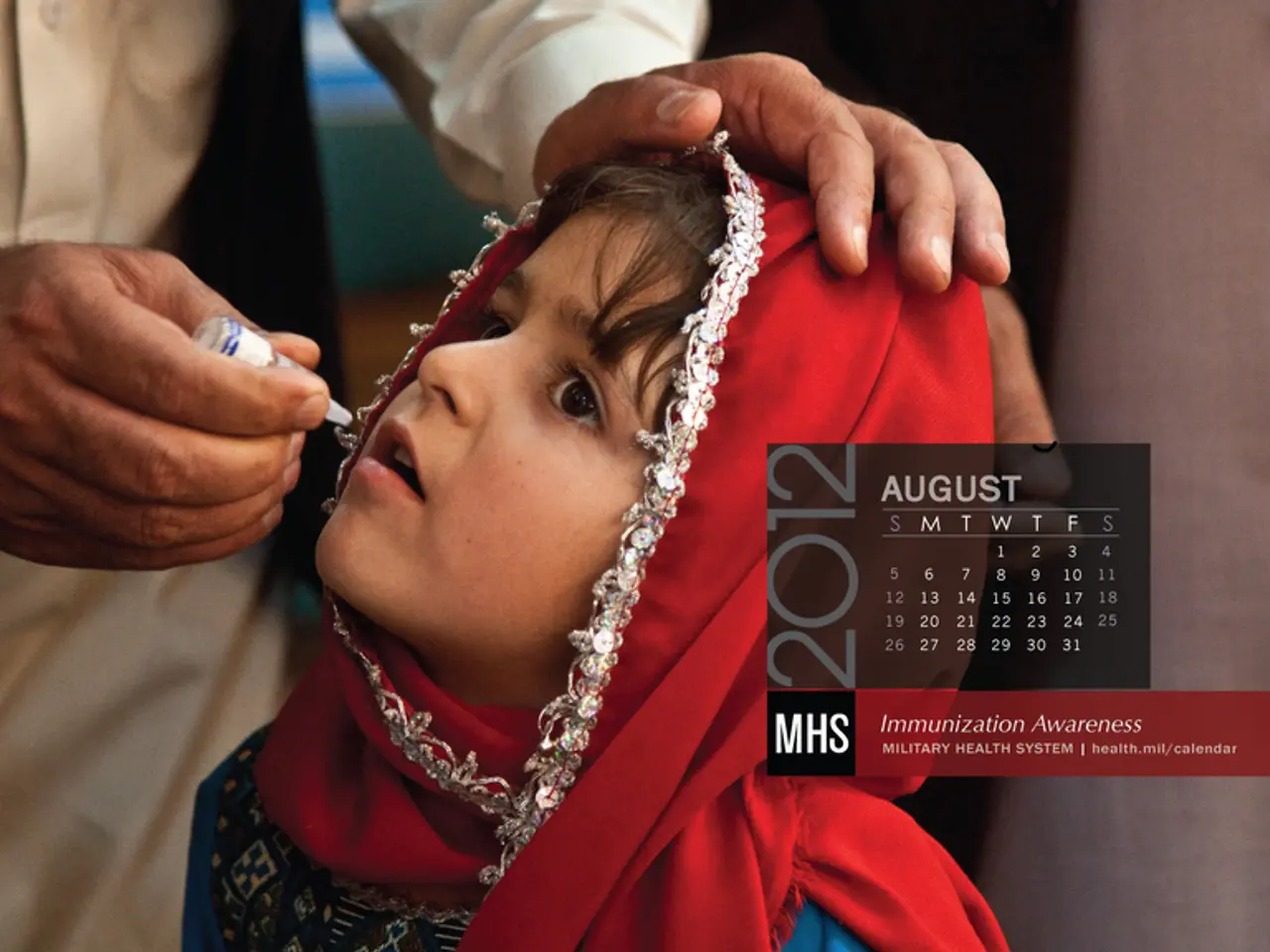Reason for parents' reluctance to inoculate their kids with vaccines
In a recent interview published on the Daily website, producer Emma Rae Woodhouse discusses the growing concern over low vaccination rates and their implications for the population. The interview, conducted by Niall Paterson, features Professor Helen Bedford, a renowned children's health expert at Great Ormond Street Institute of Child Health.
The interview delves into the reasons behind the low vaccination rates, particularly focusing on the drop in uptake of the MMR vaccine. Measles vaccination rates in England have reached their lowest level in sixteen years, with only 83.9% of five-year-olds receiving both MMR doses in 2023/24, and the first dose uptake at 24 months standing at 88.9%, both figures being the lowest since 2009/10.
This decline in vaccination coverage is concerning as it falls below the critical 95% threshold needed to prevent outbreaks. This situation has led to a rise in measles cases, with over 674 confirmed cases reported in England since January 2025, with 48% of these cases in London alone.
The implications for the population are serious. Measles is a highly contagious disease that can cause severe complications such as ear and chest infections, and inflammation of the brain (encephalitis), which can lead to hospitalization and lifelong consequences. Infants under one year and immunocompromised individuals who cannot receive the vaccine rely on herd immunity—protection provided by high vaccination rates in the wider community—to stay safe. However, with current vaccination levels dropping, there is an ongoing public health risk of a further surge in infections, especially as children return to school.
Professor Bedford emphasised the importance of catching up on missed vaccinations to prevent further spread. Public health officials are urging parents to use the summer months to update their children's vaccinations to reduce the risk before the next school term begins.
Unfortunately, the situation is particularly dire in areas like London and parts of the North West where vaccination rates and coverage are particularly low. This was tragically highlighted by a recent case at the Alder Hey Hospital in Liverpool, where a child with measles passed away.
The interview serves as a stark reminder of the importance of vaccination in maintaining public health. As we navigate through these challenging times, it is crucial that we prioritise the health and safety of our children and community.
[1] Public Health England. (2025). Measles outbreaks and vaccination rates in England. Retrieved from https://www.gov.uk/government/publications/measles-outbreaks-and-vaccination-rates-in-england [2] NHS England. (2025). Measles: Symptoms, prevention, and treatment. Retrieved from https://www.nhs.uk/conditions/measles/ [3] Centers for Disease Control and Prevention. (2021). Measles (Rubeola). Retrieved from https://www.cdc.gov/measles/index.html [4] Royal College of Paediatrics and Child Health. (2025). Measles outbreaks in England: A call for action. Retrieved from https://www.rcpch.ac.uk/newsandpublications/news/measles-outbreaks-in-england-a-call-for-action [5] Local Government Association. (2025). Measles outbreaks: The role of local authorities in prevention and response. Retrieved from https://www.local.gov.uk/about/news/measles-outbreaks-role-local-authorities-prevention-and-response
- The worrying trend of low vaccination rates necessitates a deeper discussion about medical-conditions and chronic-diseases.
- In regions like London, concern over respiratory-conditions has escalated due to the drop in vaccination rates.
- Cancer research institutions should prioritize research on the impact of diseases like measles on digestive-health.
- Eye-health advocates are closely monitoring the rise in measles cases associated with the low vaccination rates.
- Recent developments have heightened the need to focus on hearing disorders in light of the surge in measles infections.
- Health-and-wellness experts are urging people to prioritize vaccinations to bolster health protection.
- Fitness-and-exercise enthusiasts remind us that a healthy body is the first line of defense against any chronic-disease.
- With the surge in environmental-science research, it's crucial to study the connection between climate-change and the drop in vaccination rates.
- Mental-health practitioners call for increased awareness on the psychological effects of fear-mongering regarding vaccines.
- Nutritionists stress the importance of a balanced diet in maintaining a robust immune system to combat diseases.
- Cardiovascular-health experts are studying the potential long-term complications of measles on heart health.
- CBD oil, a popular supplement in wellness circles, is being researched for its potential role in treating inflammatory disorders following measles infections.
- Neurological-disorders specialists are concerned about the rise in brain diseases linked to measles outbreaks.
- Due to the relevance of this issue, environmental-science students are encouraged to study the link between environmental degradation and decreased vaccination rates.
- Finance professionals are considering investment opportunities in medical technology to combat the spread of diseases like measles.
- Dermatologists are reporting an increase in skin-conditions caused by untreated measles infections.
- Interior-design enthusiasts are advocating for improved public health facilities to alleviate the stress on medical systems caused by increased cases of measles.
- Cooking instructors are developing recipes rich in nutrients to support immune systems during themeasles outbreak.
- Wearables manufacturers are exploring the integration of health monitoring features for early detection of measles cases.
- Smart-home-device brands are looking into offering features that remind users of vital health and vaccination appointments.
- Cybersecurity firms are adopting measures to safeguard sensitive health data during the surge in measles cases.
- The current situation is affecting lifestyle changes, making it a topic for discussion in personal-finance blogs.
- Outdoor-living enthusiasts encourage families to respect social-distancing measures during outbreaks to minimize disease transmission.
- Food-and-drink establishments are implementing stricter hygiene protocols to combat the spread of measles.
- Dining owners are participating in initiatives to promote vaccination awareness and reduce the risk of measles infections.
- Researchers are studying the impact of measles outbreaks on family-dynamics and social structures.
- Financial advisors are planning wealth-management strategies for families affected by the costs of treating measles infections.
- Home-improvement stores are offering sustainable-living products to help consumers fight climate-change and bolster public health.
- Baking hobbyists are participating in campaigns promoting healthy-cooking practices, reminding people that good food is crucial to wellness.




